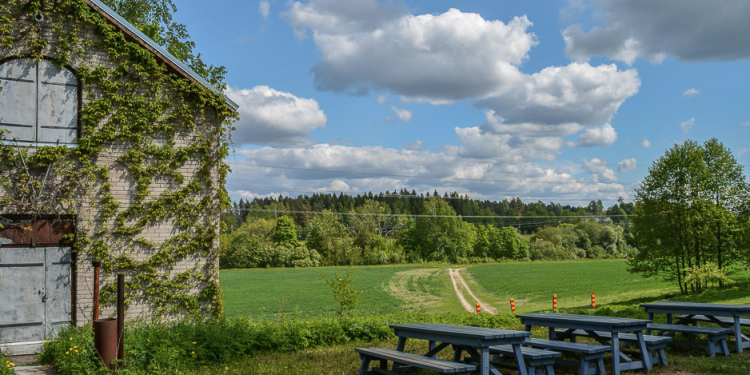
Jutismita moved from the fast-paced Delhi to Helsinki as a trailing spouse. With her move to Europe, Jutismita discovered not only a different lifestyle and landscapes but also a whole new self. She talks to Expat.com about her new habits, big loves (spoiler alert: travelling included), and the challenges of expatriation to northern Europe.
Please introduce yourself. Where are you from, and why did you move to Finland?
I am Jutismita Hazarika from Assam, a beautiful state located in north-eastern India. I grew up in Assam surrounded by beautiful tea gardens and abundant nature. Life back there was and still is simple and slow. But after completing high school, I moved to New Delhi for further studies. The city holds a very special place in my heart as it is the place where I spent ten years of my life and learnt to be on my own. After I finished my studies, I worked in Delhi as a travel writer and social media manager. I am very passionate about travelling, food, and social discoveries, so finding a job that allowed me to pursue my passions was the best thing that could have happened to me.
I moved to Finland because of my husband's work. Life in Finland has been completely different from the life in Delhi but it has been a positive change. The best thing about this move has definitely been the process of finding time to reconnect with me — something that was much needed after having lived for so many years in fast-paced Delhi. Finland has made me appreciate nature, solitude, and simplicity like I used to when I was a kid.
What was the process to move to Finland?
The process to move to Finland is different for people with different nationalities and backgrounds. For example, non-EU citizens can apply for a visa on the basis of work, studies, dependency, asylum, or entrepreneurship. Generally, if all the requirements are met, the process is not very complicated. The process is more relaxed for Nordic and EU citizens. Depending on the intent of the move, not everyone may need a residence permit but in case one does it depends on one's nationality and the length of their stay in the country. To get a residence permit one must prove adequate income to support their life in Finland. To find out more details you can visit this page.
What has surprised you the most about Finland?
In one word, everything. First of all, never did I imagine in my life about coming to Finland and living here. It has been more than two years since I landed in Helsinki and yet the country never fails to surprise me. I didn't expect Helsinki to be a typical European city but it is in many ways; from its old buildings to the art and coffee culture. However, Helsinki also has its Nordic characteristics and, to be honest, I couldn't tell the difference before I moved here. The shyness of the people and their helpful nature surprises me a lot. For me, it was a cultural shock to see how seriously the Finns take their personal space, even in public areas, and how everything goes quieter after 10 pm. You feel the cold vibe at the elevator for example, when you don't really know your neighbours but at the same time, you feel liberated in public places when nobody really pays any attention to you. Staring at someone here is a social offence that no one commits. Despite the shock, everything has been a learning experience, and every day I am experiencing something new.

What are the features of today's expat job market in Finland?
The basic requirement for an expat to work in Finland is to be able to speak and write the language. There are not too many places to work without knowing any Finnish, and mostly for reasons such as health and safety, and communication with co-workers. However, some of the Finnish companies are gradually opening their doors to English-speaking employees. For example, getting a job in the IT and design sectors sometimes doesn't require Finnish language skills. Currently, there are not enough jobs for everyone (for both the local population and expats), and the number of unemployed people is on the rise. However, the immediate future in the Finnish labour market looks promising according to the reports. So, the first step for getting a job in Finland would be to start learning the language. Local authorities usually offer integration programs for immigrants that include language training and other vocational courses — most of which are free. Also, registration at the local employment office is a must. Some people also believe that getting a degree in Finland helps a lot in finding a job.
How easy or difficult it is to find accommodation in Finland, and what type of accommodation is available for expats?
The process of finding accommodation in Finland can vary in different cities. In Helsinki, the cost of accommodation is expensive. One can apply for accommodation at a city-owned rental housing, but the number of applicants is very high. Also, there are private housing rental companies for more readily available options. A residence permit is a must for renting an apartment. Some international companies take care of their employees' accommodation. Usually, all the apartments are fitted with modern amenities.
What are the year's biggest holidays in Finland? What is some essential etiquette?
The biggest holiday in Finland is Christmas and the New Year's Eve. Almost a month before Christmas, the cities, especially Helsinki, are decked up with lights and other beautiful installations. This is a beautiful time to be in Finland and the festive vibes can be felt everywhere. Among other important holidays are Easter, Ascension day, and Midsummer Day. Mayday or Vappu, the official Spring celebration in Finland, is one of the most awaited festivals of the year; after a long and heavy winter, people are excited to welcome the spring season. In fact, the Finns take all kinds of celebrations very seriously; Mother's and Father's days are equally important holidays. Finland's Independence Day on December 6th is also celebrated with lots of enthusiasm.
How do you find the lifestyle in Finland? What is your everyday life like?
Lifestyle in Finland is expensive but super comfortable. The public transport system is very good and all the other amenities are easily available. Some public utilities such as libraries are free for all. Having access to the internet is everyone's legal right. However, for the Finnish population, being surrounded by technology doesn't keep them away from nature. Finland is probably one of the few countries in the world where modern technology, old architecture, and nature coexist without any conflict. We are always just a few steps away from nature and there is no dearth of free spaces. Life here is slow but surprisingly productive.
On a regular day, I spend about five to six hours at my Finnish language school. However, evenings and weekends are always spent outdoors. My days are filled with long walks in the park, quick visits to the library or lots of quiet time at the coffee shops. Since the sun does not go down till 12 am in the summertime here in Helsinki, there is still a lot of time left for other activities. I use my night time for blogging, editing pictures, and freelance writing.

How is the transportation system in Finland?
The transportation system in Finland is very well planned and maintained. Both the cities and the rural areas are well connected by high-quality roads and public transports. In fact, the public transportation system is so good that one doesn't need a car to commute. Besides, Finland is one of the top bicycle-friendly countries in the world. The Finnish people are environment and heath conscious, which is why they prefer to use public transport or bicycles. Trains and buses run to and from all the urban areas in Finland. However, public transportation is not cheap in Finland.
Have you been able to adapt to Finland and the society there?
It is a bit difficult to find that sense of belonging but I think I am getting there. Finnish people are generally shy, care too much about their personal space, and also do not enjoy talking to strangers. It may be a stereotype but this kind of notions make you very conscious about invading their space. Initially, it was very hard for me, as in India people are more connected to friends, family, and neighbours. I miss my family and friends, and most importantly, I miss having a huge social circle. For the same reason, I don't see myself living here permanently. However, at the same time, I have come to appreciate solitude better, I respect the rules as well as the Finnish etiquettes, and occasionally enjoy a good sauna session like the Finns do.
What do you do in your free time?
My free time is mostly spent outdoors. Be it Helsinki or any other Finnish city, there is always some sort of interesting activity going on, especially in the summer. Weekends are filled with cultural events, food festivals, and outdoor sports. Nightlife in Helsinki is exciting; pubs and nightclubs are open until the wee hours and people enjoy drinking. Drinking in public places in the summer at events and festivals is very common. Also, Finland is very safe to roam around at night even for women.
What new habits have you developed and what old habits have you quit in Finland?
I think I have acquired quite a few. For example, even if I complain about neighbours not being friendly enough or the absence of a highly charged social life, secretly, I have come to love quiet weekends, simple dinners or altogether uneventful days. So, it doesn't matter if the winter days are lonely and grey, I just do not like too much noise anymore. The greatest realisation, however, is that now I understand that it is not necessary to speak or voice my opinion unless it is required. In other words, silence is fun. Besides, I love neutral colours now, I think about my health more than ever (since Finnish people are very healthy), and I am affected by the weather — I never before appreciated the sun so much, and have let go of unhealthy lifestyle choices.
What is your opinion on the cost of living in Finland?
The cost of living in Finland is very high and, in fact, Finland is one of the most expensive countries to live in Europe. Taxes in Finland are high and so are the costs of amenities. But the salaries are also high when compared to other European cities. The concept of minimum wage makes life better. The government provides free education for those having a permanent residence permit. Having a permanent residence permit is not the same as having citizenship but it comes with lots of benefits. Apartment rental, eating out, transportation — are all expensive, but childcare is not, as the government takes care of it. The government also provides social security which includes unemployment benefits, housing allowance, and healthcare.
What is something that you would like to do in Finland but haven't had the opportunity to do yet?
The Northern Lights. I desperately want to see it, but so far I haven't had any luck. I travelled to Lapland, but I didn't see any due to the bad weather. Since I live in Helsinki the chances are very low as the phenomenon occurs in the southern part of Finland; plus the light pollution makes it difficult to spot any aurora. It has now become my life's dream to sit under the sky and witness that incredible spectacle.

Can you please share your most memorable experience in Finland?
So far, it has to be witnessing the midnight sun. Initially, I couldn't sleep during summer time due to the brightness. But now I enjoy it as it is one of the most stunning and rare experiences of my life. A walk in the park at 12 am in the bright light doesn't seem like a strange idea anymore.
If you could do the move to Finland over, what would you do differently?
Since my husband was already living in Finland, my move was very smooth and I didn't have to worry about my visa and other formalities. For those with a residence permit, a work permit is also available except that jobs are not readily available. I wish I had done some research about the job market and my prospects before moving to Finland. I came with lots of hope about finding a job and was hit by the reality later. Luckily, I could still freelance for sites that needed articles in English.
What do you think of the local cuisine? What are your favourite dishes?
Finland has a food culture that is very different from the rest of Europe. Their cuisine is basically a combination of rustic flavours and continental cooking styles. A normal meal in a Finnish household is like having nature served on a plate. Usually, lots of raw vegetables are used as side dishes. Finnish people also have this unimaginable love for dairy products. The country consumes one of the world's highest amounts of milk per capita. Reindeer meat is a very popular delicacy all over the country but I have no intention of trying it. Somehow, I don't think Santa would approve.
My most favourite local cuisine has to be the famous salmon fish soup (lohikeitto) and peruna salatti (potato salad). Otherwise, the Nordic style cuisine is very different and doesn't always suit our Indian palate. I do share the country's passion for coffee and can't live without a good cuppa at a street-side kahvila (coffee shop). Amongst all the traditional sweets, I love runebergintorttu, a jam filled cake dedicated to the country's most loved poet Johan Ludvig Runeberg.
What do you miss the most about your home country?
The food. Eating out in Helsinki is fun but it is very difficult to be adventurous. I miss the vibrant food culture of Delhi and the traditional Assamese fare.
Have you had a moment that you almost felt like leaving from Finland? How did you overcome that?
Initially yes as it was difficult to stay at home and the entire job search process was depressing. When I first moved in, it was that transition time from winter to spring which is the most difficult time even for Finns; everything at that time is gray. But I took the free time as an opportunity to do all the things I wanted to do. For example, I had ample time to travel and document my experiences. At first, we were to live in Finland for one year and I took it as a sabbatical to enjoy the new life. But now, I have started learning the language, making efforts to make friends, and acquiring new skills such as photography and baking.
What motivated you to create your blog 'A Thousand Diversions'?
The best thing about moving to Finland was being one step closer to the other European destinations where I had always wanted to travel. Now that it is easier to plan my trips from here, I find myself travelling more than I intended. Initially, I started the blog for friends and family who wanted to know all the details about my travels and also because I missed writing. Later, I started seeing it as a great way to keep myself busy and my passions alive. Over the time, I have worked hard on making it more professional. I have still a long way to go to become a full-time, professional blogger but A Thousand Diversions is something I am very proud of. In short, it makes me happy. Recently, I shifted my blog to a self-hosted platform. Although the change has caused lots of technical and visual difficulties, I think it is shaping up the way I wanted it to. I named it A Thousand Diversions because I didn't want to restrict my blog to one category.
Give us some useful tips that soon-to-be expatriates in Finland will benefit from
Finland is a very beautiful country and offers a good life but one should know that the most difficult part of integrating into the Finnish society is the long process of learning the language. It is one of the most difficult languages in the world but it is not at all impossible. One simply has to invest time. So my advice for future expats would be to come with an open mind and be prepared to face the struggles of work life, not feeling included, and not finding the sense of belonging. Eventually, it will happen but it takes time.
What is one thing that you will take with you from Finland?
I don't know yet. I have spent the most beautiful phase of my life in Finland but it hasn't come to a full circle yet. I am a new person, and rather than taking something materialistic I would like to take all those beautiful changes along.




















Comments